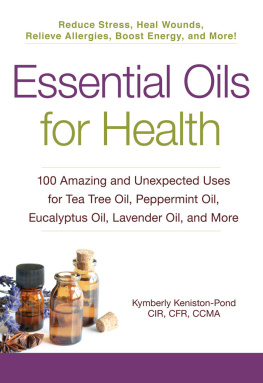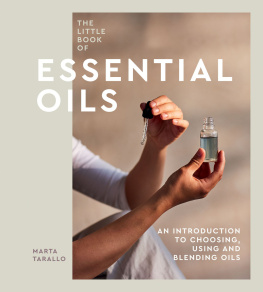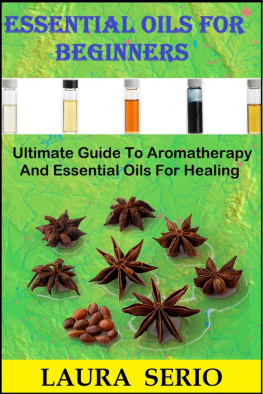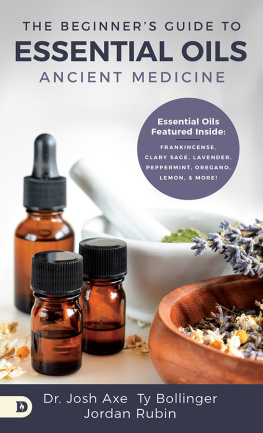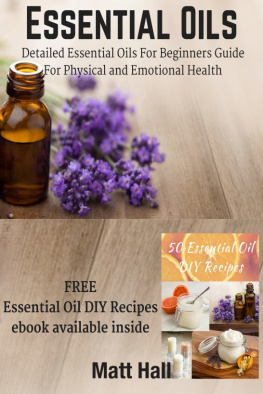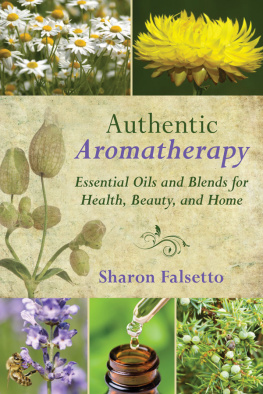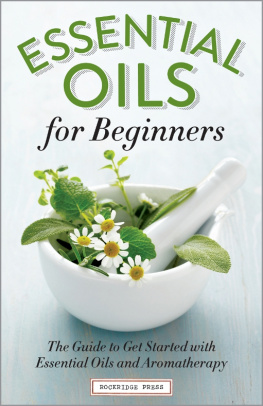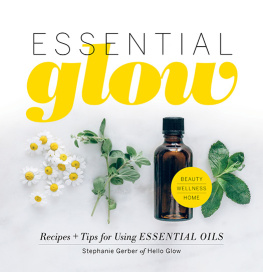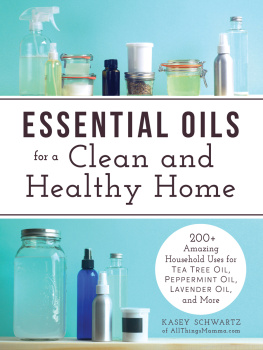Essential Oils for Health
100 Amazing and Unexpected Uses for Tea Tree Oil, Peppermint Oil, Eucalyptus Oil, Lavender Oil, and More
Kymberly Keniston-Pond, CIR, CFR, CCMA

Avon, Massachusetts
Dedication
First I dedicate this book to my handsome, funny, kind, supportive husband, Mark! You really are the Wind Beneath My Wings ;-) Love you.
Second, I dedicate this book to you, the reader, for your investment of time. May it prove to be a most serendipitous of beginnings in the beautiful world of aromatherapy.
CONTENTS
INTRODUCTION
What do Cleopatra, who enticed kings; Queen Esther of Persia, who saved her people from annihilation; and Queen Zenobia of Palmyra have in common? A love affair... with essential oils!
These women were not only beautiful from their use of essential oils, but they took the time to learn how to use them to add strength of mind, capture the interest of their husbands and lovers, reduce joint pain, support their bodies through a detox after overindulging in food and drink, and many more remedies.
Today there is a growing interest in essential oils for their therapeutic, emotional, and energetic properties. In fact, you can get an overload of information that at times contradicts itself. How do you use these oils? Do you ingest them or not? Can you use them randomly on the skin without diluting? What if you are under a doctors supervision and on medicationare there any contraindications? How do you store essential oils? How long will they last? From what part of the plant do you get the oils? How are these parts processed? How do you know you are purchasing pure essential oils? These and many more questions will be addressed in this book in an ethical, unbiased way.
You will find a large number of essential oils to be antibacterial, antifungal, anti-inflammatory, antiseptic, analgesic, carminative, antirheumatic, cell rejuvenating, skin enhancing, and much more. On the emotional and energetic side they stimulate creativity, calm the mind, lessen panic attacks, uplift, cleanse negative thoughts, quiet the mind... the list goes on.
In this book you will become intimate with twelve essential oils: clary sage, clove, eucalyptus, frankincense, geranium, ginger, lavender, lemon, peppermint, rosemary, tea tree, and ylang ylang. These are common and affordable. There are more than 100 simple, yet effective recipes to use in your daily life. Learn how one essential oil can support you on many levels.
You dont have to be a queen to have a love affair with essential oils, but you can feel like one as you use them. Turn the page and let your love affair with essential oils begin!
THE MANY HEALTH BENEFITS OF ESSENTIAL OILS
What Is an Essential Oil?
An essential oil is extracted from the flowers, leaves, roots, bark, fruit, resins, seeds, needles, or twigs of a plant or tree. A variety of methods are used to extract the oil, the most widespread form being steam distillation. After the extraction, the liquid on top of the water is the highly concentrated oil that will have the aroma of the plant along with all therapeutic properties particular to that plant. The liquid on the bottom is the hydrosol, which is a diluted but equally important property. The oil on top is 100 percent pure, 100 percent natural, and contains the full therapeutic, emotional, and energetic properties of the plant. Make sure the oil you purchase is not adulterated. Because the oil is highly concentrated, you will need only a few drops to produce the results you intend. In this case, less is more. Essential oils are not oily and thus are volatile, meaning they will evaporate, so be sure to recap the bottle when youre done using it.
What Is a Carrier Oil?
A carrier oil is extracted from the portion of the plant that is fatusually the seed, kernel, or nut. Each carrier oil has its own therapeutic properties, making these an integral and complementary part of a blend. Some common carrier oils are jojoba, grape seed, coconut, rosehip seed, avocado, apricot kernel, and castor. These are oily and will not evaporate.
Why Do They Need Each Other?
Just as when making another kind of purchase, you need a carrier to transport the goods, since they will disappear if unattended. The carrier you use will need to fit the specifics of your purchase. An important reason to use a carrier oil is that essential oils are volatile; they will quickly evaporate. Each carrier oil has its own therapeutic properties that will enhance or support the essential oil once it is delivered. There are a few essential oils that do not need a carrier, and these will be addressed in a later section of the book.
Safely Respect These Beautiful Gifts
By showing due respect for the concentration of chemical properties in pure essential oils, you can positively incorporate them into your daily life. To use them successfully, you must know how to use them safely. Please note the following guidelines:
- Do not use the following oils if you have or are suspected of being vulnerable to epileptic seizures: camphor, fennel, hyssop, rosemary, lavandin, sage, spike lavender, and thuja. These can be too stimulating to the nervous system.
- Essential oils must be stored in dark, airtight glass bottles. When exposed to light, oxygen, and heat, the properties of the oils begin to break down, and they become irritating to the skin. If stored properly, they may last seven to ten years, although this varies. Citrus oils are an exceptionthey should be kept only one to two years. All oils need to be kept at temperatures between 45F65F. If you notice your citrus oils becoming cloudy, they are going bad.
- Use oils very cautiously during pregnancy and while breastfeeding. Essential oils can be used during these times but only under the guidance of a certified aromatherapist and/or medical professional with accurate knowledge of essential oils. Oils should always be a 1 percent dilution during pregnancy.
- Do not use hyssop oil if you have high blood pressure.
- For children, the elderly, pregnant women, or people with severe health challenges, always use a dilution rate of 1 percent, which is a total of 56 drops per 1 ounce (2 tablespoons/30 mL) of carrier oil. A gentler approach is to use hydrosols.
- Always dilute essential oils in a carrier oil before applying to the skin. You may experience a skin tingling or a burning sensation. If this happens, immediately apply a carrier oil to the affected area and wipe off. Lavender and tea tree are generally safe to use directly on the skin.
- Many citrus oils, including bergamot, as well as cumin, opoponax, angelica root, rue, lemon verbena, and tagetes, cause photosensitivity. Sunlight or sun bed rays must be avoided for at least 12 hours after application unless you wear protective clothing. These oils applied to the skin in any dilution may increase the chance of severe burns from the ultraviolet light.
- Do not put essential oils around the eyes or near orifices. If an essential oil does contact these areas, immediately flush with a carrier oil and wipe off the excess. (Plain water will not mix with essential oils. A fatty oil (carrier) can be used, or if you want to use saline solution drops, that will work. A carrier oil will take a bit longer to pull the essential oil out of the eye, but it is safer.)If irritation persists, seek medical attention.
- Persons with allergies to perfumes or who have asthma need to proceed cautiously with oils.
- Application of essential oils to the skin or fur of animals should be done

